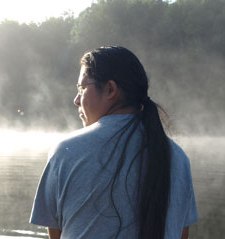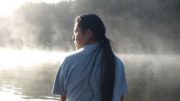by Xavier Kataquapit
(Under the Northern Sky) – I received a note from my sister Janie Wesley this past week that included an historic document. It was a short message that asked me to look at the image of a typewritten telegram or letter that was transmitted on October 17, 1945. It detailed the admission list of children to be sent to the Albany Indian Residential School including my father Marius Kataquapit, one of his brothers and my mother Susan’s brother.
Janie pointed out that this note was messaged just a week before our father’s fifth birthday. The other children on the list would have been similar ages at the time.
In 1945, my father’s family would have been living a very traditional life on the land surrounded by their extended relations. They would have been fluent in the Cree language and would have had very little to do with any European ways of living or communicating. Their lives would have revolved around surviving on the land following traditional practices, activities and ways of living that were thousands of years old.
I have often wondered how my father’s father James Kataquapit would have marvelled at the European people that affected his life. His livelihood was governed by the fur trade and how best to deal and gather income from English and French traders who took his collection of animals furs that had been painstakingly and carefully gathered, prepared and transported over long distances with many weeks of hard labour. His meagre earnings would then be handed back to the same traders in return for a little food and resources to keep his family alive. The European colonizers dominated much of his life and even his spiritual life was filled with the Christian religion while traditional spirituality was suppressed.
As a young man in his 20s, he was asked to take part in a great war for a ‘Kitchi-Okimaw’, a great leader or a King. He was gone for just under two years to serve in the Canadian Forestry Corp in England during the First World War. He witnessed the development that the ‘Mishtikooshoo’, the white man had done in the south. He had boarded a steel hulled ship that took him over the great ocean and wondered to himself if he would ever return. He visited lands on the other side of the world and saw the signs of a great struggle of war, death and destruction.
He was at least somewhat content knowing that he was being paid for his efforts and was happy to return home to his family in the north when the war was over. When he arrived in Canada and travelled north, he was simply dropped off at a wilderness rail stop near Hearst. This is where he went on his own and followed a tributary of the Albany River north to James Bay and back to his home and family in Attawapiskat. When he arrived home, he learned that some of the young men he left with simply never returned.
His return left him in the same situation as when he had left. His earnings were managed by the same European traders and church leaders that held the means for him to feed his body and soul. During his absence, his income from the war had evaporated with the excuse that it was used to provide for his parents and family. After having gone overseas for a war he didn’t understand and worked for two years away from home, he went back to living with nothing and surviving on the land with his own skill and abilities.
Later, as a middle aged man with children, he was being forced by the Government of Canada to give up his young sons under the guise of education. This was not simply a request but a demand as anyone who refused would have their children forcibly removed by authorities. The family was told that the boys would be gone for the winter and return in the spring but both James and his wife Janie feared that their boys might never come home. This turned their world upside down and made them very sad and anxious. The boys did return but they were changed forever.
My father Marius had very little to say about his memories of his time in residential school. He confided that it was a painful time for him as he was thrust into a foreign world, filled with strangers who followed strange customs and spoke a foreign language. He felt that he was punished for who he was as an Aboriginal person and that the separation from his parents at such a young age scarred him for life.
I was deeply moved by the simple government residential school document that my sister Janie forwarded to me. She had received it from a family friend Roseanne Sutherland, who now works for Chiefs Of Ontario (COO) and is conducting her own research on the residential school era in the James Bay area. This document was a reminder of an atrocity that was done to our children. The idea that the government thought it was a good thing to steal away all of the children from our communities was terrible. It was an effort to assimilate our people and thankfully it did not work. Documents such as this bears witness to a crime that broke and bent our communities on a generational basis.
For more columns by Xavier Kataquapit visit underthenorthernsky.com





Be the first to comment on "Under the Northern Sky: Remembering When"